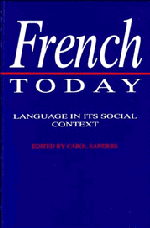Book contents
- Frontmatter
- Contents
- List of figures and maps
- List of tables
- Notes on the contributors
- Acknowledgements
- Introduction
- 1 French: a planned language?
- 2 Sociosituational variation
- 3 Regional variation in France
- 4 The other languages of France: towards a multilingual policy
- 5 The migrant languages of Paris
- 6 Gender and language in French
- 7 The reform of the writing system
- 8 Alternative French
- 9 New words for new technologies
- 10 Language and style in politics
- 11 French and French-based Creoles: the case of the French Caribbean
- 12 French in Africa
- 13 French in Canada
- 14 Sociolinguistic variation and the linguist
- Bibliography
- Index
14 - Sociolinguistic variation and the linguist
Published online by Cambridge University Press: 05 June 2012
- Frontmatter
- Contents
- List of figures and maps
- List of tables
- Notes on the contributors
- Acknowledgements
- Introduction
- 1 French: a planned language?
- 2 Sociosituational variation
- 3 Regional variation in France
- 4 The other languages of France: towards a multilingual policy
- 5 The migrant languages of Paris
- 6 Gender and language in French
- 7 The reform of the writing system
- 8 Alternative French
- 9 New words for new technologies
- 10 Language and style in politics
- 11 French and French-based Creoles: the case of the French Caribbean
- 12 French in Africa
- 13 French in Canada
- 14 Sociolinguistic variation and the linguist
- Bibliography
- Index
Summary
Introduction
Although we know that a thousand years ago when Hugues Capet was elected king of France (987), ‘French’, the vernacular of the Ile de France was only one dialect among many and remained so for centuries, French is undeniably the language of most people living in France today and in many francophone countries throughout the world. The various coups de force which have led to the imposition of French as a national language in France and elsewhere have been well documented in a variety of works and will not be discussed here (cf. Balibar and Laporte 1974, Vermes and Boutet 1987). Whether royal or republican, the agents of the state (the schools, the universities, the law, the police, the army), supported by strata of the local populations wishing to increase their social and economic standing, have successfully completed their task. We speak of ‘success’ here in the sense that, despite many repressive measures which have led to this situation, the vast majority of citizens in ‘hexagonal’ France at least would unhesitatingly describe French as their mother tongue.
A component of this spread of French is the belief in the unity of the language. This belief is carefully nurtured by what I called above the ‘agents’ of the state.
- Type
- Chapter
- Information
- French TodayLanguage in its Social Context, pp. 257 - 286Publisher: Cambridge University PressPrint publication year: 1993
- 6
- Cited by

